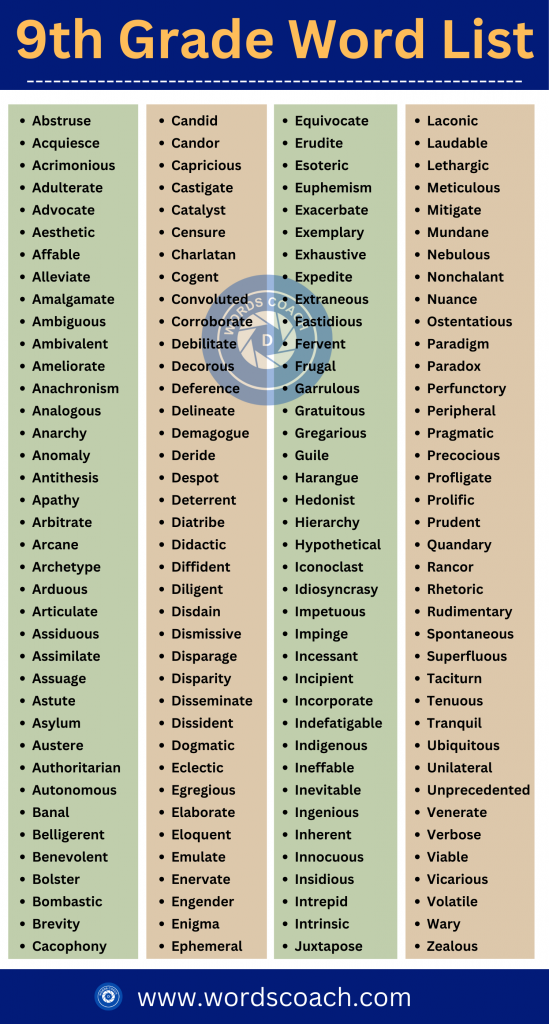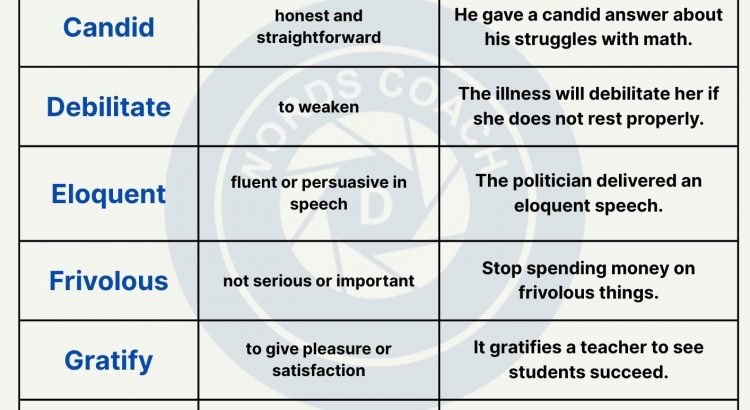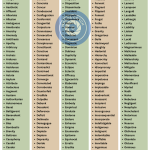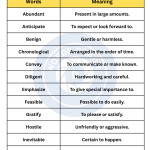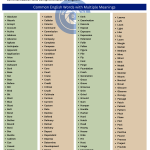9th Grade Word List
As students step into high school, their reading, writing, and communication skills become more advanced. By 9th grade, learners are expected to engage with challenging texts, write persuasive essays, and express complex ideas. A solid 9th grade word list helps them expand their vocabulary, strengthen comprehension, and prepare for academic success.
9th Grade Word List with the meaning
Here are some essential words every 9th grader should learn:
| Word | Meaning |
|---|---|
| Abstruse (adj.) | Difficult to understand; obscure. |
| Acquiesce (v.) | To accept something reluctantly but without protest. |
| Acrimonious (adj.) | (Typically of speech or a debate) angry and bitter. |
| Adulterate (v.) | To render something poorer in quality by adding another substance. |
| Advocate (v.) | To publicly recommend or support. |
| Aesthetic (adj.) | Concerned with beauty or the appreciation of beauty. |
| Affable (adj.) | Friendly, good-natured, and easy to talk to. |
| Alleviate (v.) | To make suffering, deficiency, or a problem less severe. |
| Amalgamate (v.) | To combine or unite to form one organization or structure. |
| Ambiguous (adj.) | Open to more than one interpretation; unclear. |
| Ambivalent (adj.) | Having mixed feelings or contradictory ideas about something or someone. |
| Ameliorate (v.) | To make something bad or unsatisfactory better. |
| Anachronism (n.) | Something or someone that is not in its correct historical or chronological time. |
| Analogous (adj.) | Comparable in certain respects, typically in a way that makes clearer. |
| Anarchy (n.) | A state of disorder due to absence or non-recognition of authority. |
| Anomaly (n.) | Something that deviates from what is standard, normal, or expected. |
| Antithesis (n.) | A person or thing that is the direct opposite of someone or something else. |
| Apathy (n.) | Lack of interest, enthusiasm, or concern. |
| Arbitrate (v.) | To reach an authoritative judgment or settlement. |
| Arcane (adj.) | Understood by few; mysterious or secret. |
| Archetype (n.) | A very typical example of a certain person or thing; an original model. |
| Arduous (adj.) | Involving or requiring strenuous effort; difficult and tiring. |
| Articulate (v.) | To express an idea or feeling fluently and coherently. |
| Assiduous (adj.) | Showing great care and perseverance. |
| Assimilate (v.) | To take in and understand fully; to absorb and integrate. |
| Assuage (v.) | To make an unpleasant feeling less intense; to satisfy an appetite or desire. |
| Astute (adj.) | Having or showing an ability to accurately assess situations or people; shrewd. |
| Asylum (n.) | The protection granted by a state to someone who has left their home country as a political refugee. |
| Austere (adj.) | Severe or strict in manner or appearance; extremely plain and simple. |
| Authoritarian (adj.) | Favoring or enforcing strict obedience to authority. |
| Autonomous (adj.) | Having the freedom to govern itself or control its own affairs. |
| Banal (adj.) | So lacking in originality as to be obvious and boring. |
| Belligerent (adj.) | Hostile and aggressive. |
| Benevolent (adj.) | Well-meaning and kindly. |
| Bolster (v.) | To support or strengthen; prop up. |
| Bombastic (adj.) | High-sounding but with little meaning; inflated. |
| Brevity (n.) | Concise and exact use of words in writing or speech. |
| Cacophony (n.) | A harsh, discordant mixture of sounds. |
| Candid (adj.) | Truthful and straightforward; frank. |
| Candor (n.) | The quality of being open and honest; frankness. |
| Capricious (adj.) | Given to sudden and unaccountable changes of mood or behavior. |
| Castigate (v.) | To reprimand (someone) severely. |
| Catalyst (n.) | A person or thing that precipitates an event. |
| Censure (n.) | The expression of formal disapproval. |
| Charlatan (n.) | A person falsely claiming to have a special knowledge or skill; a fraud. |
| Cogent (adj.) | Clear, logical, and convincing. |
| Convoluted (adj.) | Extremely complex and difficult to follow. |
| Corroborate (v.) | To confirm or give support to (a statement, theory, or finding). |
| Debilitate (v.) | To make someone weak and infirm. |
| Decorous (adj.) | In keeping with good taste and propriety; polite and restrained. |
| Deference (n.) | Humble submission and respect. |
| Delineate (v.) | To describe or portray something precisely. |
| Demagogue (n.) | A political leader who seeks support by appealing to popular desires and prejudices. |
| Deride (v.) | To express contempt for; ridicule. |
| Despot (n.) | A ruler or other person who holds absolute power, typically one who exercises it in a cruel way. |
| Deterrent (n.) | A thing that discourages or is intended to discourage someone from doing something. |
| Diatribe (n.) | A forceful and bitter verbal attack against someone or something. |
| Didactic (adj.) | Intended to teach, particularly in having moral instruction as an ulterior motive. |
| Diffident (adj.) | Modest or shy because of a lack of self-confidence. |
| Diligent (adj.) | Having or showing care and conscientiousness in one’s work or duties. |
| Disdain (n.) | The feeling that someone or something is unworthy of one’s consideration or respect. |
| Dismissive (adj.) | Feeling or showing that something is unworthy of consideration. |
| Disparage (v.) | To represent as being of little worth; to belittle. |
| Disparity (n.) | A great difference. |
| Disseminate (v.) | To spread something, especially information, widely. |
| Dissident (n.) | A person who opposes official policy, especially that of an authoritarian state. |
| Dogmatic (adj.) | Inclined to lay down principles as undeniably true. |
| Eclectic (adj.) | Deriving ideas, style, or taste from a broad and diverse range of sources. |
| Egregious (adj.) | Outstandingly bad; shocking. |
| Elaborate (v.) | To develop or present (a theory, policy, or system) in detail. |
| Eloquent (adj.) | Fluent or persuasive in speaking or writing. |
| Emulate (v.) | To match or surpass (a person or achievement), typically by imitation. |
| Enervate (v.) | To cause (someone) to feel drained of energy or vitality; weaken. |
| Engender (v.) | To cause or give rise to (a feeling, situation, or condition). |
| Enigma (n.) | A person or thing that is mysterious, puzzling, or difficult to understand. |
| Ephemeral (adj.) | Lasting for a very short time. |
| Equivocate (v.) | To use ambiguous language so as to conceal the truth or avoid committing oneself. |
| Erudite (adj.) | Having or showing great knowledge or learning. |
| Esoteric (adj.) | Intended for or likely to be understood by only a small number of people with a specialized knowledge. |
| Euphemism (n.) | A mild or indirect word or expression substituted for one considered to be too harsh or blunt. |
| Exacerbate (v.) | To make a problem, bad situation, or negative feeling worse. |
| Exemplary (adj.) | Serving as a desirable model; representing the best of its kind. |
| Exhaustive (adj.) | Including or considering all elements or aspects; fully comprehensive. |
| Expedite (v.) | To make (an action or process) happen sooner or be accomplished more quickly. |
| Extraneous (adj.) | Irrelevant or unrelated to the subject being dealt with. |
| Fastidious (adj.) | Very attentive to and concerned about accuracy and detail. |
| Fervent (adj.) | Having or displaying a passionate intensity. |
| Frugal (adj.) | Sparing or economical with regard to money or food. |
| Garrulous (adj.) | Excessively talkative, especially on trivial matters. |
| Gratuitous (adj.) | Uncalled for; lacking good reason; unwarranted. |
| Gregarious (adj.) | Fond of company; sociable. |
| Guile (n.) | Sly or cunning intelligence. |
| Harangue (n.) | A lengthy and aggressive speech. |
| Hedonist (n.) | A person who believes that the pursuit of pleasure is the most important thing in life. |
| Hierarchy (n.) | A system or organization in which people or groups are ranked one above the other. |
| Hypothetical (adj.) | Based on or serving as a suggested explanation or assumption. |
| Iconoclast (n.) | A person who attacks cherished beliefs or institutions. |
| Idiosyncrasy (n.) | A mode of behavior or way of thought peculiar to an individual. |
| Impetuous (adj.) | Acting or done quickly and without thought or care. |
| Impinge (v.) | To have an effect or impact, especially a negative one. |
| Incessant (adj.) | Continuing without pause or interruption. |
| Incipient (adj.) | In an initial stage; beginning to happen or develop. |
| Incorporate (v.) | To take in or contain something as part of a whole; to include. |
| Indefatigable (adj.) | (Of a person or their efforts) persisting tirelessly. |
| Indigenous (adj.) | Originating or occurring naturally in a particular place; native. |
| Ineffable (adj.) | Too great or extreme to be expressed or described in words. |
| Inevitable (adj.) | Certain to happen; unavoidable. |
| Ingenious (adj.) | (Of a person) clever, original, and inventive. |
| Inherent (adj.) | Existing in something as a permanent, essential, or characteristic attribute. |
| Innocuous (adj.) | Not harmful or offensive. |
| Insidious (adj.) | Proceeding in a gradual, subtle way, but with harmful effects. |
| Intrepid (adj.) | Fearless; adventurous (often used for rhetorical or humorous effect). |
| Intrinsic (adj.) | Belonging naturally; essential. |
| Juxtapose (v.) | To place or deal with close together for contrasting effect. |
| Laconic (adj.) | (Of a person, speech, or style of writing) using very few words. |
| Laudable (adj.) | Deserving praise and commendation. |
| Lethargic (adj.) | Affected by lethargy; sluggish and apathetic. |
| Meticulous (adj.) | Showing great attention to detail; very careful and precise. |
| Mitigate (v.) | To make less severe, serious, or painful. |
| Mundane (adj.) | Lacking interest or excitement; dull. |
| Nebulous (adj.) | In the form of a cloud or haze; hazy; vague or ill-defined. |
| Nonchalant (adj.) | (Of a person or manner) feeling or appearing casually calm and relaxed. |
| Nuance (n.) | A subtle difference in or shade of meaning, expression, or sound. |
| Ostentatious (adj.) | Characterized by vulgar or pretentious display; designed to impress or attract notice. |
| Paradigm (n.) | A typical example or pattern of something; a model. |
| Paradox (n.) | A statement that contradicts itself but might be true. |
| Perfunctory (adj.) | Carried out with a minimum of effort or reflection. |
| Peripheral (adj.) | Relating to or situated on the edge or periphery of something. |
| Pragmatic (adj.) | Dealing with things sensibly and realistically. |
| Precocious (adj.) | (Of a child) having developed certain abilities or inclinations at an earlier age than usual. |
| Profligate (adj.) | Recklessly extravagant or wasteful in the use of resources. |
| Prolific (adj.) | Present in large numbers or quantities; plentiful. |
| Prudent (adj.) | Acting with or showing care and thought for the future. |
| Quandary (n.) | A state of perplexity or uncertainty over what to do in a difficult situation. |
| Rancor (n.) | Bitterness or resentfulness, especially when long-standing. |
| Rhetoric (n.) | The art of effective or persuasive speaking or writing. |
| Rudimentary (adj.) | Involving or limited to basic principles. |
| Spontaneous (adj.) | Performed or occurring as a result of a sudden inner impulse. |
| Superfluous (adj.) | Unnecessary, especially through being more than enough. |
| Taciturn (adj.) | (Of a person) reserved or uncommunicative in speech; saying little. |
| Tenuous (adj.) | Very weak or slight. |
| Tranquil (adj.) | Free from disturbance; calm. |
| Ubiquitous (adj.) | Present, appearing, or found everywhere. |
| Unilateral (adj.) | Performed by or affecting only one person, group, or country. |
| Unprecedented (adj.) | Never done or known before. |
| Venerate (v.) | To regard with great respect; to revere. |
| Verbose (adj.) | Using or expressed in more words than are needed. |
| Viable (adj.) | Capable of working successfully; feasible. |
| Vicarious (adj.) | Experienced in the imagination through the feelings or actions of another person. |
| Volatile (adj.) | Liable to change rapidly and unpredictably, especially for the worse. |
| Wary (adj.) | Feeling or showing caution about possible dangers or problems. |
| Zealous (adj.) | Having or showing zeal; ardently active, devoted, or diligent. |
The 9th grade word list is not just about memorizing words—it’s about understanding and using them effectively in real life. With regular practice and curiosity, students can master these words, improve academic performance, and communicate with confidence.
Want to Learn More?
| 8th grade word list | 7th grade word list | 6th grade word list |
| English Proficiency Test | 100+ Gen Alpha Slang Words | Basic Sentence Quiz |
Download Word Coach Application
